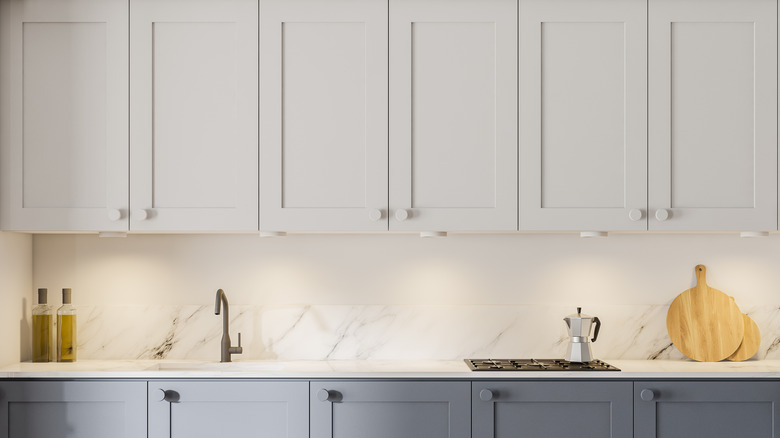Here's When You Might Want To Use Upper Cabinets As Lowers Instead
When it comes to designing a new kitchen, people typically select two different types of cabinets to create a cohesive set: uppers and lowers. Uppers have less depth than lowers, allowing space for the countertop below. The standard depth for an upper cabinet is typically 12 to 15 inches, while a base is 24 inches. However, home design rules are meant to be broken, so you don't always have to follow this layout. Perhaps you don't have enough room in your kitchen for bulky bases, or maybe you found a great deal on uppers and are wondering if there are other ways to utilize them. To figure out when it's acceptable to use upper cabinets as lowers, we reached out to interior designer Erika Dale for her input.
In order for the installation to look refined rather than odd, Dale recommends only utilizing this hack if you're not trying to match them to existing cabinets. "Avoid trying this hack in any space where you are trying to match other base cabinets, as the measurements and details are unlikely to be an exact match. It could end up looking poorly cobbled together and unrefined," Dale exclusively tells House Digest. "Stick to using this hack when your uppers-as-lowers will be a standalone unit." For the smoothest outcome, consider using them as furniture in a room rather than kitchen storage. Here is a closer look at why.
Use upper cabinets as lowers outside of the kitchen
Lower kitchen cabinets can easily be upcycled into storage cabinets in spaces like living rooms, offices, and entryways, adding plenty of organizational space to those rooms. "The best place to use uppers as lowers is when you can float the units by mounting them on the wall just off the floor like a piece of furniture," Dale exclusively tells House Digest. "This could be under a TV as a media console, in an entryway for extra storage, or in an office as a credenza." It's best to float them so you can easily tailor the height of the piece to best suit your needs. For example, if it's a storage unit for toys, you will want it lower to the ground. But if it's a credenza in a dining room, you will want it higher to match the height of the dining table better.
This is the best way to use uppers, since there are plenty of consoles and storage cabinets that have the same depth as an upper cabinet. For example, the HEMNES TV unit from IKEA is 18 inches deep and the GALANT office cabinet is 17 inches. Because of this, it would not look weird to the eye if you used an upper cabinet in those spaces. You can even repurpose those upper kitchen cabinets to create custom storage in the kids' room, mudroom, or even a flex room currently used as a home gym or crafts space.
Workarounds for using them inside the kitchen
While it's not generally recommended to use uppers as base cabinets in a kitchen, sometimes you don't have a choice. Maybe your kitchen space is tight, and you want enough room for an island. Or perhaps you're on a tight budget and scored some uppers for a steal. In those cases, you can substitute uppers for the lowers, but you will need to build a foundation for them to sit on. "Because they do not have the base that lower cabinets usually do, if you plan to sub in upper cabinets for lowers, you will need to build a base for a toe kick and baseboard, as well as achieve the correct finished height," Dale exclusively tells House Digest. "It isn't an overly advanced project, but it also isn't necessarily best for a DIY novice either."
If you would rather not go such a complicated route, you can also hang the cabinets above the floor, negating the need to build a base. Per Dale, the standard height of lower cabinets is 34.5 inches, while uppers can range anywhere from 30 to 42 inches high, so make sure to hang them to meet that height. However, you don't typically see floating lowers in a kitchen. This might make your space feel slightly off since you are not only using skinnier cabinets but also hanging them from the wall. Because of this, consider going the base route.
